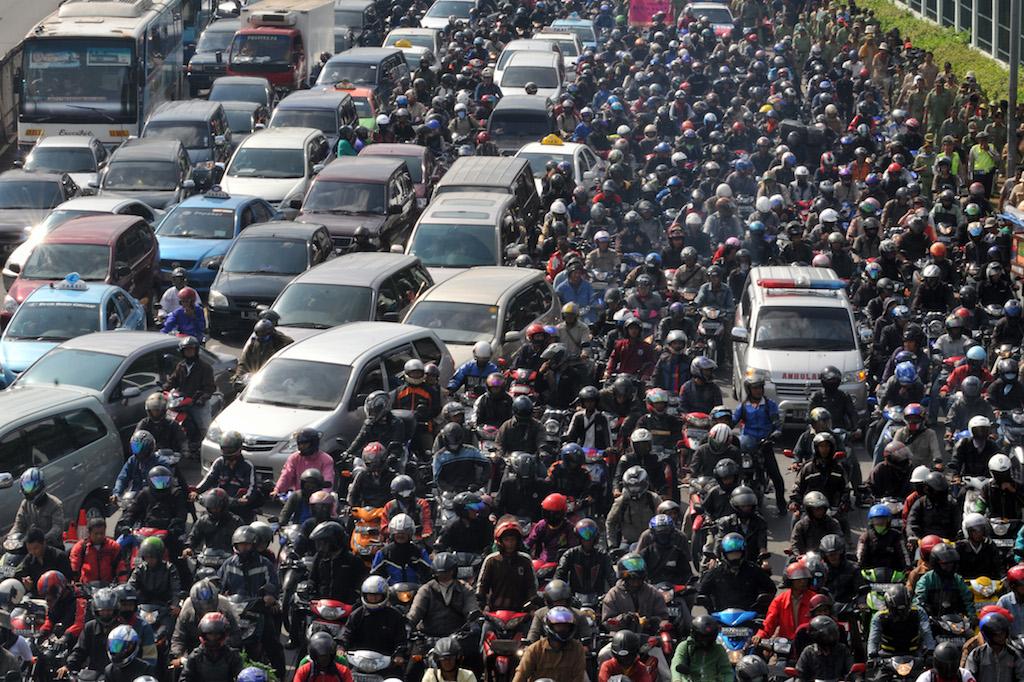Jakarta threatens toilet scrubbing as punishment for jaywalking and littering
Jakarta’s governor vows to tame the sprawling city’s legendary chaos — in part by using toilet scrubbing as an official punishment for civic infractions like jaywalking, littering and driving on sidewalks.
JAKARTA, Indonesia — Think about it: Would you rather walk an extra 100 yards to the next crosswalk, or risk scrubbing public toilets in urban train stations?
That’s a question residents of Jakarta will be asking themselves in the coming months as the Indonesian capital escalates the battle against its legendary civic chaos.
Jaywalking, littering, driving a car without a license or a motorcycle without a helmet, stopping at unofficial bus stops, even handing money over to beggars — you’d better think twice in this teeming capital.
Jarkata’s authorities will not only fine you, but also order you to scrub the detritus left behind by some of the city’s 10 million inhabitants.
It’s not about saving money, says Jakarta Deputy Governor Basuki Tjahaja Purnama, who announced the new punishments at the end of November. “This is all part of an education program” to “get people to live in order” and “improve the capital,” he told Indonesia’s news agency Antara.
Authorities appear prepared to be creative in the endless campaign against turmoil in one of the world’s most sprawling cities. Along with these unorthodox “social sanctions,” as Jakarta’s deputy governor has called them, city officials are setting up a website that will allow road users to “name and shame” fellow motorists by posting pictures of traffic offences online.
The police warned that lawbreakers would be identified and fined.
Fauzi, a 34-year-old hotel staff member in central Jakarta, says he’s not against the new measures, but he won’t tattle on other motorists. “It would be a good way to practice my photography,” he laughs, “but I won’t report others, because I sometimes break the law myself.” He acknowledges regularly “missing” red lights and crossing the road where he’s not supposed to.
Like two thirds of the other road users in Jakarta, Fauzi drives a motorcycle, squeezing between lanes in the jam-packed rush-hour traffic, but he says he still spends several hours stuck on the streets every day.
In Jakarta, the same journey can take from 10 minutes to three hours according to the time of day. People regularly compromise on rules to shave off minutes here and there. Motorcyclists drive on the wrong side of the street, and take to narrow pedestrian bridges. Sidewalks and bus lanes have long been fair game for everyone.
This last problem, at least, is seeing some improvement with the recent implementation of a 2009 law to fine drivers who use the bus lanes.
Fauzi agrees: “Public transportation is the solution but drivers have to respect the special lanes. Jokowi is making them,” he says, referring to Jakarta’s governor, Joko Widodo. In power for just over a year, the popular governor was recently named by pollsters the man to beat in the July 2014 presidential elections.
Prior to his unexpected election as governor of Jakarta, Mr. Joko was mayor of Surakarta, in central Java, where he managed to relieve traffic congestion by implementing a rail/bus system and relocating the hordes of street vendors out of the traffic lanes.
He has yet to prove he can do as well in the gigantic capital. A survey published last October showed a majority of residents didn’t believe he had done any better than his predecessors, but he has asked them to be patient. He says the construction of a long awaited monorail system and the relaunch of a 20-year-old railway project will make a difference.
The city’s public transportation options are currently very limited, and walking through the polluted equatorial city is hardly pleasant; many pedestrians wear masks, and they must watch out for the occasional open sewer.
But while residents are eager to see change, old habits die hard. The October survey revealed that most respondents blamed traffic congestion on the number of cars, but drivers seem little inclined to give up their vehicles. To encourage carpooling, authorities impose minimum occupancy requirements on vehicles during peak hours. To circumvent this, drivers pay entrepreneurial “jockeys” to jump in.
Indeed, creative responses to previous new laws cast doubt on the potential for the new toilet cleaning initiative to act as a deterrent rather than some unimagined business opportunity — perhaps for police officers looking to supplement their income.
The World is an independent newsroom. We’re not funded by billionaires; instead, we rely on readers and listeners like you. As a listener, you’re a crucial part of our team and our global community. Your support is vital to running our nonprofit newsroom, and we can’t do this work without you. Will you support The World with a gift today? Donations made between now and Dec. 31 will be matched 1:1. Thanks for investing in our work!
